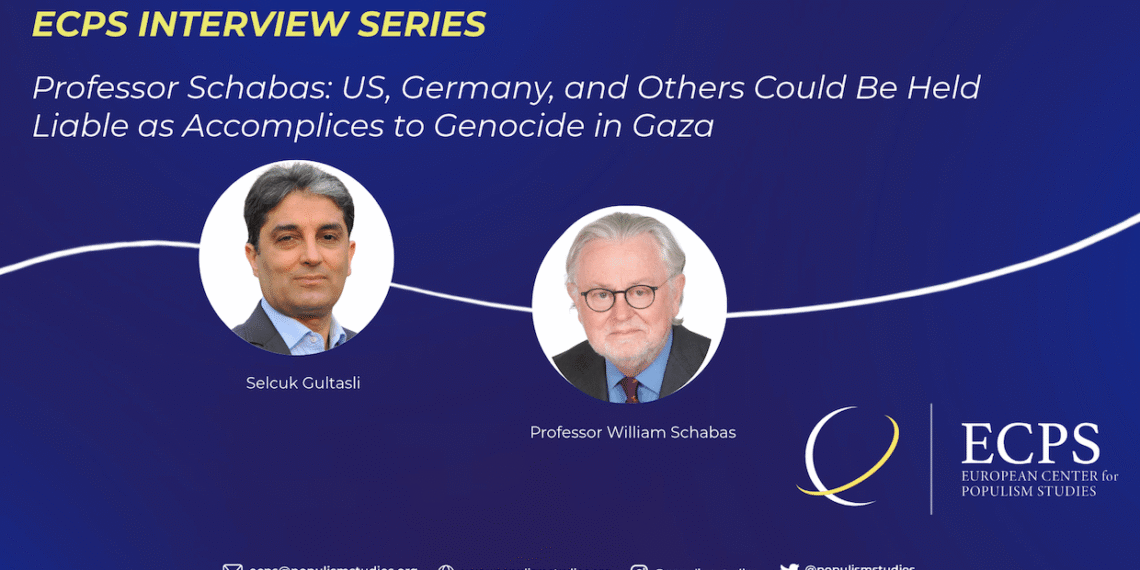In an exclusive interview with ECPS, Professor William Schabas, one of the world’s foremost authorities on genocide and international criminal law, warns that the Gaza crisis represents a “litmus test” for the credibility of international justice. He argues that the case filed by South Africa against Israel at the ICJ is “arguably the strongest case of genocide ever brought before the Court,” citing Israeli military actions and statements by senior officials as evidence of genocidal intent. Professor Schabas also highlights Prime Minister Netanyahu’s populist rhetoric, framing Gaza’s population as an existential threat, which he links to patterns of incitement fueling atrocities. Crucially, he stresses that third-party states, including the US, Germany, and others risk legal liability as “accomplices to genocide.”
Interview by Selcuk Gultasli
In an extensive interview with the European Center for Populism Studies (ECPS), Professor William Schabas—one of the world’s foremost authorities on international criminal law and genocide studies, and a professor at Middlesex University—offers a detailed assessment of the unfolding crisis in Gaza through the lens of international law, populist politics, and global governance. Coming from a family of Holocaust survivors, Professor Schabas warns that Gaza represents a “litmus test” for the credibility of international justice and the authority of global legal institutions.
At the heart of his analysis is a stark conclusion: the case brought by South Africa v. Israel before the International Court of Justice (ICJ) is “arguably the strongest case of genocide that has ever come before the Court.” He argues that evidence of genocidal intent can be inferred not only from Israel’s military conduct but also from statements by senior Israeli officials, such as Defense Minister Yoav Gallant’s remarks about cutting off food, water, and electricity in Gaza. “We have more than just a pattern of conduct—we also have statements and clear indications of policy. All of these must be considered together when making a final judgment,” said Professor Schabas.
Professor Schabas also highlights how Prime Minister Netanyahu’s populist framing of Gaza’s population as an existential threat has intensified concerns about incitement and mass atrocity crimes. “Racist populist rhetoric has often been part of genocidal contexts, mobilizing mass support for atrocities. We see elements of that dynamic in Israel today,”he said. Drawing comparisons to Rwanda (1994) and the Namibia genocide (1904–1906), he underscores both the parallels and distinctions, warning against simplistic analogies while emphasizing recurring patterns where populist narratives fuel extreme violence.
Importantly, Professor Schabas stresses that third-party states—including the US, Germany, Canada, and others—risk being held legally accountable under Article III of the Genocide Convention for aiding and abetting Israel through military and political support. He warns: “To the extent that they are providing material assistance of a significant nature, they can be held responsible as accomplices to genocide.”
Finally, he frames Gaza as a defining moment for international justice mechanisms like the ICJ and ICC, warning that failure to apply consistent standards risks entrenching a “two-tier system of international law” and undermining human rights globally: “These institutions are absolutely vulnerable, and they are aware of it. Gaza is a test for their credibility and authority.”
This interview situates Gaza within broader debates about populism, authoritarianism, and international accountability, offering an urgent call to rethink legal, institutional, and political frameworks for preventing mass atrocities in an era of resurgent populist authoritarianism.


